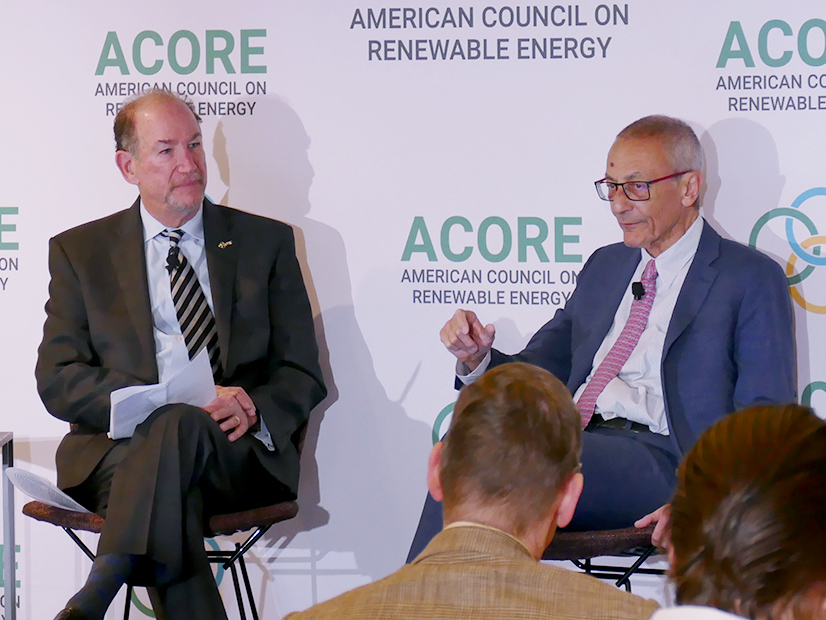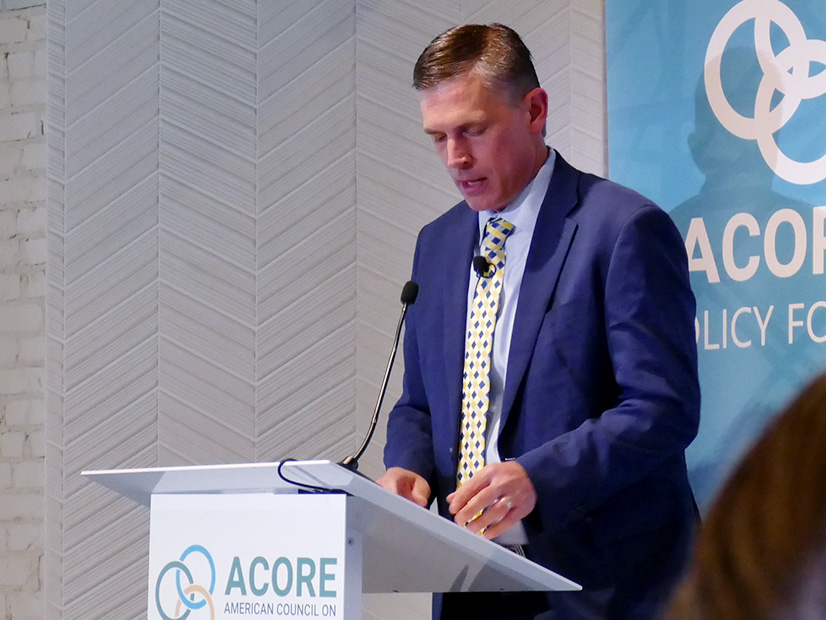
WASHINGTON — While they recognize that changes to permitting laws are needed to fully realize the benefits of the Inflation Reduction Act, Democratic officials told the American Council on Renewable Energy on Thursday that a package emerging from House Republicans is a poor start.
Successful bipartisan permitting legislation is more likely to come out of the Senate, said John Podesta, a senior adviser to President Biden on clean energy innovation and implementation.
The House of Representatives is “going to produce some legislation, and they’ll pass it,” Podesta said at the ACORE Policy Forum. “My guess is they won’t consult with Democrats very much. They’ll sort of put together what’s their wish list of assets.”
The White House could work with House Republicans if they come up with sensible proposals that “respect science” and do not “undermine core environmental laws,” Podesta said. But several senators are interested in working on serious permitting legislation, including Sen. Joe Manchin (D-W.Va.), who tried to get a bill through last Congress, and his fellow West Virginian across the aisle, Sen. Shelley Moore Capito, Podesta said.
The attention that permitting is getting from senior officials will help move things along in a process that is performed in the agencies with little attention from the heights of government, Podesta said.
“There’s nothing like accountability: having people at the top know that they’re responsible for working through and breaking through unacceptable delays,” he added.
Biden has also directed his cabinet to make sure that they are using their existing powers, which include some backstop siting authorities for the Department of Energy and FERC from the Energy Policy Act of 2005, Podesta said.
 Sen. Martin Heinrich addresses ACORE on Thursday. | © RTO Insider LLC
Sen. Martin Heinrich addresses ACORE on Thursday. | © RTO Insider LLC
Both Podesta and Sen. Martin Heinrich (D-N.M.) have worked for years to try to get Pattern Energy’s SunZia transmission project built, which would bring up to 4,500 MW of wind power from New Mexico to markets in Arizona and Southern California. Podesta recalled working on it in the Obama administration in 2015 and thinking the line would move forward, only to find out that Pattern had not started construction when he started working for Biden.
The line recently received a final environmental impact statement from the Bureau of Land Management, and a final decision on its route over federal lands is expected this spring, said Heinrich.
“As we build out more transmission lines like this one and overhaul our existing transmission infrastructure, we can bring many, many more large-scale clean energy and storage projects onto the grid,” Heinrich said, “but only if we move much more quickly than we have in the past. It has taken more than a decade and a half for a series of developers to navigate the complex siting and permitting processes for just this transmission line.”
Eliminating carbon emissions from the power sector will require doubling, or even tripling, the capacity of the grid, and while Congress passed legislation last session that includes significant funding for transmission, more change is needed, Heinrich said.
“We all know we have to go a lot further,” Heinrich said. “And that means addressing the underlying problem: that financing timelines and the time it takes to get these major infrastructure projects through complex permitting processes simply don’t match up.”
Heinrich plans on introducing bills intended to improve the transmission planning process and would require that the multiple benefits of transmission be considered in cost allocation. He also plans to introduce a tax credit for transmission, which ACORE has found would spur $15 billion in private investments.
On changes to permitting, Heinrich said he was preparing legislation that would give FERC and DOE conditional authorities to expedite siting processes for high-voltage transmission through a collaborative process that involves states, tribes and other federal agencies.
Besides federal changes, Heinrich urged any firms interested in developing major transmission lines to meet early and often with the impacted communities so they can develop alternatives and avoid conflict as much as possible.
“I would encourage developers to look at issues like environmental mitigation and working with tribes as opportunities for positive engagement rather than just confrontational obstacles,” Heinrich said.
Changing permitting laws has a path to get through Congress this session, with Heinrich saying it is one of the few areas where the two parties have some overlapping goals. But he would rather see something like what Manchin proposed last Congress than what House Republicans have floated so far.
“There’s definitely a potential path,” Heinrich said. “And I think the question is, can the House become a bit more pragmatic? It is driven by its right flank right now; it is making a lot of statements; [but] at the end of the day … [you] come to Congress hopefully to get things done, not just make statements. And that’s the pivot that we need.”



